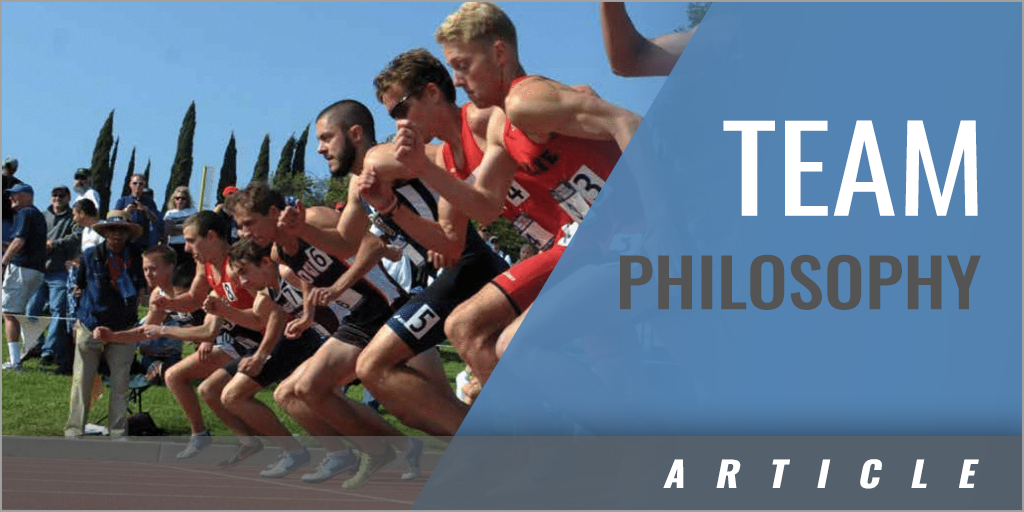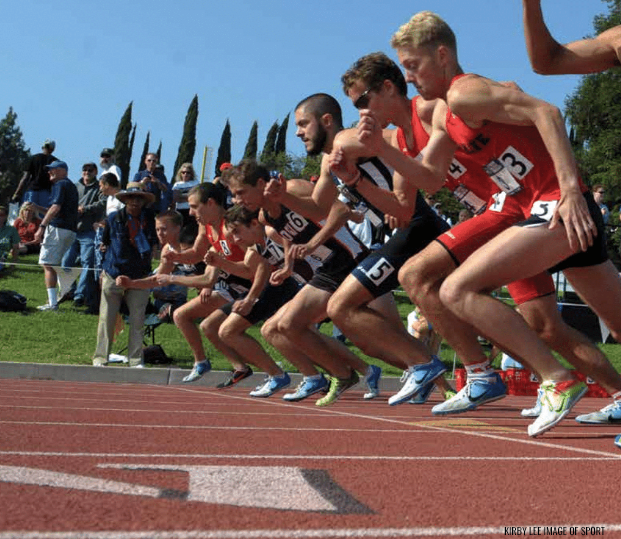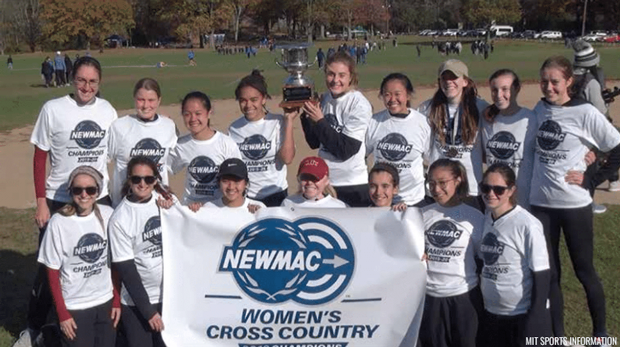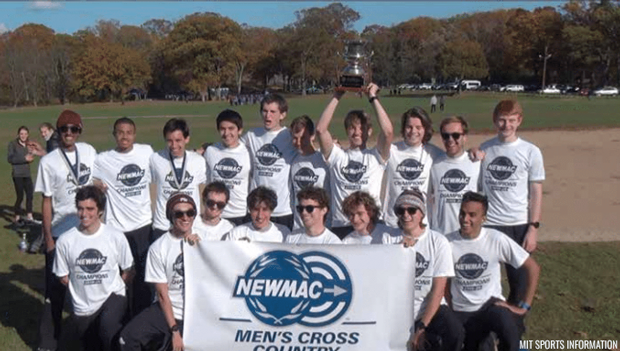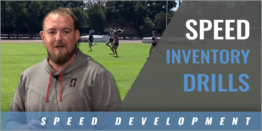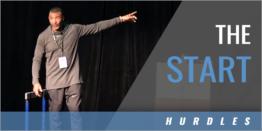|
By: Halston Taylor Originally Published in: Techniques Magazine Provided by: USTFCCCA The sport of track & field does not lend itself to being a team sport. With 17 events spread over seven different disciplines in high school and 20 events in college, along with academic schedules that make it next to impossible to have a team practice schedule most college student-athletes can attend, building a team culture is very challenging and must be intentional. The reward may be many team championships for your program. What follows is a guide to achieving that end.
THE PROCESS • As suggested above, I feel there must be a process in place. Athletes and coaches will change, but if you stick to a proven and successful process, you will do well year after year. Our process has an overarching Mission Statement and Guiding Principles and then a two-pronged approach. Areas such as recruiting, training and coaching all must be at the highest level and are assumed to be so within the scope of this description. While the process does not change, tweaking the components of it should happen regularly for the program to continue to grow. • First and foremost, there must be a Mission Statement and Guiding Principles so you have a consistent basis as to how decisions and policies are made. Most head coaches have them, but the assistants and each member of the team may not be aware of them, or sometimes they are in the mind, but not on paper. Everyone must be aware of these so that all decisions fall within what is accepted under that statement and principles. All decisions will be consistent and will be understood by all members of the team. This keeps things transparent and the consistency high. Below are the Mission Statement and Guiding Principles I developed at MIT. MISSION STATEMENT • To establish and maintain a program of excellence that is grounded by competent physical and mental development of the individual, to ultimately bring about a team performance that is greater than the sum of its parts. GUIDING PRINCIPLES - TEAM • To place sportsmanship, ownership, respect and honor as the cornerstones of the program. • To strive to place among the top four teams at the NCAA Division III Championships while also focusing on winning the New England Division III and NEWMAC Championships each season. • To try and win all scoring meets, while not sacrificing the above principle. • To set a winning tradition through accountability, communication, leadership and support, thus providing the best team atmosphere possible. • To instill an understanding that by focusing on the team approach, everyone will perform at a higher level in order to support the team. • To continue to develop and implement a leadership training program that educates individuals (mentors, group leaders and captains) on the team philosophy and to develop a two-way path of communication that takes into account the captain's and mentor's points of view, with the goal being everyone will be on the same page. GUIDING PRINCIPLES - INDIVIDUAL • To maximize the student-athlete's ability in the event(s) in which they have the most potential on a world ranking list. • To understand that the first obligation is to the team, contributing to the team principle that the whole is bigger than the sum of its parts. • To focus on competitiveness (place finish) in every competition versus the focus on performance (PR). • To provide every opportunity of com- • To continue to focus on the support of each individual by everyone on the team. • To train and compete at the highest level while understanding that one's health is a higher priority. • To honor the academic role of the student-athlete, understanding our practice window and respecting the student-athlete's academic needs. Both the Mission Statement and Guiding Principles were created by the coaching staff and the captains. The coaching staff should begin with a rough draft since they will likely have a longer tenure and sense of history than the current student-athletes. The captains can then work with the coaching staff to fine-tune or change to provide the best fit for the program. LEADERSHIP PHILOSOPHY Similar to your mission statement and guiding principles, most of us have a leadership philosophy, but it may not be written any-where. Also, like those two aforementioned components, this will tend to be a constant work in progress. Why have this in writing? It is important that your assistants and student-athletes know what you expect from them, and like-wise, they want to know what they should expect from you. Perhaps more importantly, what do you expect of yourself. Without putting words to paper, you invite inconsistency throughout your program. See Appendix A for my Leadership Philosophy. HIRING COACHING STAFF If you do not have it already, develop a list of skills and characteristics you would like to see from your coaches. Like many things when you are starting out, it will be a work in progress. Separate the list into those skills and characteristics you absolutely must have, those you feel you can develop if the candidate is open to and interested in learning, and those that would be really great to have, but you can live without. These are the ones that may be the tie breakers in who you hire. See Appendix B for my list. Hiring a coach who lacks passion, wants to do things their way and is not interested in fitting in with the system will throw your program back by years. Building a successful program takes years, but it can be destroyed in a matter of weeks. If you cannot find the right fit, be prepared to either hire someone with the passion and desire to learn but may be lacking the coaching pedigree you are looking for, or use alums in the area to help in the interim. If you have to, do it yourself. I believe every head coach should be able to coach every event at a passable level. Not only will this serve you well if you get caught with no assistant coach, but it will also allow you to better know if your assistants are being safe in their approach to coaching your student-athletes. DRINK THE KOOLAID Once everyone believes they are the best, it is much easier to make it a reality. Coaches, captains and team members must be speaking the same language. They almost have to be looking past their lower level opponents, while the coach keeps them focused on the task at hand so unexpected losses do not occur. It must start with the coaches. When I first took over the women's xc program, the team had no confidence. I suggested that I had my sights on Nationals and they should be embarrassed to be losing in the NEWMAC Championship so badly when none of the NEWMAC schools were nationally ranked. They looked at me like I had three heads. The student-athletes on that team did not see themselves as champions. That first season (2006) they were fully capable of winning, but a couple injuries and a lot of negative and inward thinking ended that miserable season with us finishing 4th in the NEWMAC meet and 14th in New England. They did not see themselves as better than these other LEADERSHIP A lot of teams cannot get to the next level because they take the easy way out and have their captains elected by the team, which turns into either a popularity contest or goes to the best performing individuals on the team. In the best of scenarios, a program can get lucky if the individuals selected by the team are great team players and the coach increases the captain's chances of success by providing leadership training. What is more likely to happen is that the captains selected are more popular due to their extracurricular social behavior. They do not flesh out problems within the team, and indeed may be the source of many problems themselves. For many years, I fostered the scenario above, yet I complained about coaches who were moved into administration with no training at that job or managing people. I was doing the same thing to my captains. They had virtually no chance of success as they were not trained for the job.
Running at an equal and parallel level to "Drink the Koolaid" is establishing a system of leadership and mentorship in which everyone on the team is educated about the support we have for one another, the team's expectations and how we go about meeting those expectations along with the priorities within each season. We start with the book "The Team Captain's Leadership Manual" by Jeff Janssen, and we added "The Mentoring Manual" by Julie Starr and "The Elements of Mentoring" by W. Brad Johnson. This is taught to any freshman or sophomore wishing to be an eventual captain or mentor. Those wishing to be a captain must also take a second year of training that deals more with practical applications of the position and does so in a discussion and role-playing format. The books we
The culmination of this is a seamless product that has empowered the captains, removed all drama and issues from the team atmosphere and allowed the teams to focus on the championships they know they can win without internal obstacles. WHAT IS A TRACK & FIELD TEAM TO YOU Do you want a team that wins dual meets, conference championships, national championships or all the above? You can let your resources (budget, admissions, facilities, coaching staff) dictate what your team looks like, or you can stick with your philosophy. There is no right answer. (Friends and Alumni development is beyond the scope of this article but is something critical to the success of our program). What you should not be is a coach who gives up on all those goals because they feel they do not have the resources to compete at any of those levels. These coaches live vicariously through whichever athletes they have, but never try to develop a team. There have been times where we have been competitive at every level, including placing second at the NCAA Division III championship with only two coaches. I was brought up in team sports and old school, so having a complete team is important to me. I have been through every possible iteration of coaching and travel resources and have never had any recruiting edge with admissions. There is no question it is easier to go with your resources as that is the most efficient and less frustrating path. A national title can be won with strength in just a couple of areas if those areas are strong enough. Regardless which path you choose, it is important to stay the course. At MIT, we have no control over who gains admission. We may have 10 pole vaulters and zero sprinters. We are almost always void in an area or two. We are still able to win a large majority of the time by sticking with our process. APPENDIX A LEADERSHIP PHILOSOPHY I am driven and committed to constantly improve myself as a person in every aspect of my life. This includes my character, as well as my role as a husband, father, friend and coach. My goal as a coach is to provide the necessary leadership to assistant coaches and student-athletes to achieve our mission statement while adhering to our guiding principles. EXPECTATIONS FOR ME • To not judge: allow myself to consider the environment, culture and background of the individual and ask questions when it is not clear what someone means or says. • To be fair: fully investigate every situation so I have as much information as possible, rather than take the first statement presented as the facts. • To care about the person: Regardless of winning or losing, or performances achieved or failed, I want to first consider the person's well-being, personal development and academic standing. • To make myself available: Provide open hours for coaches and student-athletes to schedule time or drop by. • To listen: I do not always need to solve problems. I expect to be a proficient listener first, and provide help if asked or if necessary. EXPECTATIONS FOR COACHES AND STUDENT-ATHLETES • I want it to be clear I want my student- athletes to understand that their academics come first within the limitations recommended in our commitment statement. • Parallel to their academics, our student-athletes will understand that their health (mental and physical) is critical to me as their coach and leader. • I want my assistant coaches and student-athletes to not fear failure—to understand failure is temporary. • I expect commitment. By joining this program, you hold yourself to a higher standard for your personal health. When at practices and meets, I expect you to focus on the task at hand as well to adequately prepare mentally. • I expect my assistant coaches and student-athletes to take a moment after practices and meets to reflect on what went well, what could have been done better, and to work on how to do better next time. • I expect my assistant coaches and student-athletes to support one another in practice, in meets and in life. To do this, you must know each other in a manner that will allow you to support, encourage and cheer for that person in a meaningful way. We are a team - a family. • I expect punctuality: When you are late, you are stating that your time is more valuable than others. Be respectful of other people's time. • I expect the team to come first in matters of policy or behavior. While we may agree to disagree, when the day is done, we will all be on the same page with what we say and project. I expect timely communication: When there are issues with each other, with coaches or with policies, those issues should be communicated with the appropriate person, not bantered around the team. • I expect student-athletes to follow the leadership chain of command: report issues to mentor, group leader, captain, event coach or head coach as appropriate and in that order. • I expect professional behavior by my coaches and student-athletes. This includes appropriate dress, language and respect. WHAT I WILL NOT TOLERATE • I will not tolerate alcohol or drug abuse. If it affects your practices, competition or life, you will not be retained. • I will not tolerate lying, obfuscation or deceit. • I will not tolerate harassment of any kind. • I will not tolerate tardiness. • I will not tolerate profanity in the team setting. • I will not tolerate poor sportsmanship. • I will not tolerate any illegal activity. APPENDIX B ASSISTANT COACH SKILLS AND CHARACTERISTICS - ABSOLUTELY CRITICAL PASSION Athletes will feed off what the coach brings to the table. A passionate attitude is contagious. This is not just being loud and excited about practices and meets, but that is part of it. Academics are challenging, difficult and stressful. Practice should be DESIRE TO BE PART OF YOUR PROGRAM OWNERSHIP Usually when you read cover letters, you see a lot of what a coach takes responsibility for, even though they were often not directly responsible for the coaching of an athlete, nor directly responsible for the team's success. They may have been part of it, but they take credit for more than they actually were responsible for. Do they also take responsibility when their student-athletes fail or the team fails? When interviewing, I ask to see a list of all the student-athletes the candidate has coached the past two years, with a column representing their high school best and year-by-year progress or not, and when in the season the best performances occurred. I also like to ask what areas in which the candidate needs to improve. DESIRE TO IMPROVE I not only look for coaches who know their flaws, but those who want to work to eliminate those flaws. A coach who does not ask for help or does not believe they can get an idea from anyone, has an ego that will stunt their growth as a coach. This will lead to conflicts, particularly if they do not CARE FOR STUDENT-ATHLETES It is critical that the coach cares for the student-athlete as a person, not just as an athlete. While most student-athletes love their sport and will perform well regardless of whether or not a coach cares about them as a person, the student-athlete will give more if there is a more personal relationship. Where this will really show benefits is if and when the student-athlete gets injured and feels detached from the team. ORGANIZATIONAL SKILLS This is important for pretty obvious reasons. Not knowing what is due or when, being late for requested work, or not being able to find information upon request will cause you extra work. Likewise, not presenting workouts and other information to the student-athletes in a timely manner will cause discord within the group. There is little that is more important to me than someone who only has to be told something once and gets the job done on time. COACHING ABILITY - TIME MANAGEMENT Another important part of the job is the mental ability to process information quickly and deliver a quick verbal cue to the athlete, so they can move on to the next student-athlete, or the next event if it is a meet. Not having effective time management skills will waste the student-athlete's time and frustrate them tremendously. There is rarely time at the Division III level to have long coaching conversations during practice or meets. During the interview process, I will show videos in the coach's event and ask them what they see and what they would say to me if I was one of ten of their student-athletes at practice. WRITING SKILLS This took me awhile to realize how important it would be. Anything written to student-athletes, peers, alums, outside sources or administration is a reflection on you and your program and possibly the college. Inappropriate or politically incorrect statements, poor grammar and more than the occasional spelling errors are things that should not exist often, if at all. If your assistant cannot do this, then it will fall on you. Checking all of their work will put more work on you and take more time than if you did it yourself. When I am interviewing candidates, I will have them write an impromptu article, preferably in front of me, so they cannot have someone else proof it. This has proved invaluable with recent hires. DESIRE TO RECRUIT Recruiting can be the most frustrating part of the job, particularly at a school that does not have slots or pre-reads. If the candidate is not willing to be a relentless caller and COMMUNICATION How a coach communicates with administration, alums, you the head coach, peers and athletes can be critical for the program's success. If the administration sees your assistant as someone who is not a plus to the department, it is going to be much more difficult for you to have requests granted. If alums feel they are not welcome or a part of the "family" they are less likely to contribute. If you have to wait for replies, or what you get is not clear or accurate, you will be wasting time. How your assistant communicates with peers (inside and outside department) and vendors (hotels, dining, travel) reflects on how others perceive your program. Mostly, if they are poor communicators with their athletes, do not handle questions well, cannot accept criticism or are judgmental, you will spend significant time cleaning up their messes. HALSTON TAYLOR'S TEAMS AT MIT HAVE CONSISTENTLY EXCELLED ATHLETICALLY AND ACADEMICALLY ON A CONFERENCE, REGIONAL AND NATIONAL LEVEL. HIS CROSS COUNTRY AND TRACK AND FIELD TEAMS HAVE COMBINED FOR 33 TOP-10 NCAA CHAMPIONSHIP FINISHES, ALONG WITH 53 NEW ENGLAND REGIONAL CHAMPIONSHIPS, 17 INDIVIDUAL NCAA CHAMPIONS AND 369 ALL-AMERICANS. TAYLOR'S TEAMS HAVE EARNED 64 NEWMAC CHAMPIONSHIPS, INCLUDING ALL 22 NEWMAC MEN'S CROSS COUNTRY TITLES. HE IS A 45-TIME NEWMAC COACH OF THE YEAR, A 22-TIME USTFCCCA REGIONAL COACH OF THE YEAR AND HIS WOMEN'S TEAMS CAPTURED THE NCAA DIVISION III DEB VERCAUTEREN PROGRAM OF THE YEAR AWARD IN BOTH 2014-15 AND 2010-11. |
